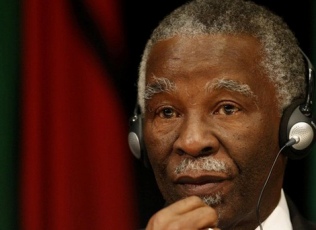African mediation team suspends peace talks on Sudan’s Two Areas
April 30, 2014 (KHARTOUM) – The African Union’s (AU) mediation team suspended the stalled peace process aimed at ending the conflict in Sudan’s South Kordofan and Blue Nile states on Wednesday, as the government and rebel delegations once again failed to conclude a framework agreement.

On 22 April, chief mediator Thabo Mbeki submitted an amended version to the two parties providing to discuss a cessation of hostilities, humanitarian assistance, and political issues related to the Two Areas. Besides that the mediation proposed to discuss the national dialogue process to achieve democratic transition in the country.
After failing during the past nine days to bridge the gaps between the two parties, the AUHIP mediators on Wednesday evening announced the suspension of the talks. The mediators are expected to report to the AUPSC for further guidance.
“The mediation will present a detailed report to the Peace and Security Council,” said an African diplomat close to the file when reached by Sudan Tribune. He further said that the two parties are responsible for the failure of the negotiations.
He underlined that the panel worked to bring the parties to agree on the main issues that they have to negotiate but every party stuck to its position and refused to make the needed concessions.
Hours before the suspension of the talks the two delegations traded accusations about a meeting they had to hold on Wednesday.
The government team accused the rebels of missing the meeting where the parties had to present their final positions on the proposals of the mediation. But the SPLM-N replied by another communiqué saying they were informed that the encounter had been scheduled for 5:00pm not 9:00am .
Since February, the government refused a demand by the rebels to unify the two tracks for peace in the Two Areas and Darfur and to hold talks with the all the factions of the alliance of armed groups, Sudanese Revolutionary Front (SRF).
The government also maintains its refusal of a framework agreement sealed in June 2011 aiming to establish a political partnership to implement democratic transition between the two warring parties in Blue Nile and South Kordofan .
Initially, Khartoum’s rejection of 28 June agreement was justified by a demand the army made to disarm the SPLM-N fighters before any political partnership. The government recently added that the national dialogue process aims to involve all the political forces including the rebel groups in the democratic transformation.
Recently the SPLM-N proposed a roadmap endorsed by the rebel SRF providing to hold direct talks with the government on the security, humanitarian and political matters in the Two Areas and Darfur, before to convene a meeting to fix the modalities of the national dialogue outside the country.
Observers in Khartoum say the government wants to settle the conflict in the Two Areas but refuses to negotiate with Darfur rebel groups for which it proposes to join the Doha Document for Peace in Darfur, a framework document signed in July 2011.
The Sudanese army this week intensified the bombing on the SPLM-N positions in South Kordofan and announced the recapture of several positions, while the rebels denounced the attacks saying over 70,000 civilians were forced to flee their villages.
The political secretary of the opposition Popular Congress Party (PCP), Kamal Omer, said the suspensions of the peace talks paves the way towards the imposition of international sanctions on the two parties.
He underlined the need for another alterative accepted by all the Sudanese political forces without exception after the suspension of Addis Ababa process.
He further proposed to move the venue of the peace talks to inside the country after the signing of a ceasefire and a presidential pardon for the SPLM-N rebels.
The opposition parties participating in the national dialogue, including the PCP and Umma party, propose to involve all the rebel groups in this internal political process which aims to discuss solutions of armed conflicts in Darfur, the Two Areas and a new constitution.
(ST)
